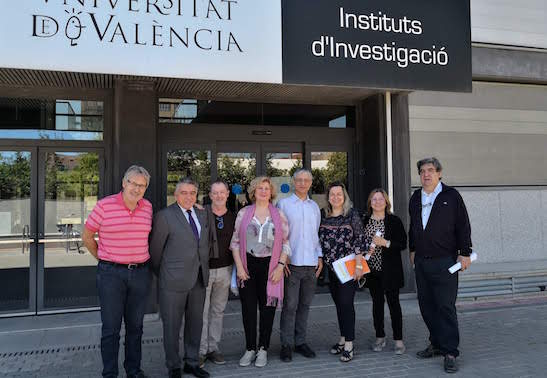IUDESCOOP actively participates in the First University Week of Social Economy
- Tarongers Institutes Support Unit
- February 19th, 2020

University Research Institute in Social Economy, Cooperativism and Entrepreneurship of the Universitat de València (IUDESCOOP) actively participates in the First University Week of Social Economy that will last from 21st to 28th of February in twenty Spanish universities.
A total of 72 activities are planned for these days, with a wide variety of events demonstrating a huge amount of work and results of the research in cooperatives, labour companies, mutual organizations, social enterprises, and third sector of social action in Spain.
At the Universitat de València, the week will start on Friday, 21st February, with a preparatory meeting on the 30th Anniversary of the Centre of European Information and Documentation on Public, Social and Cooperative Economy (CIDEC), a presentation of IUDESCOOP of the book Manual on Social Economy, and the first part of a workshop about starting research in Social Economy.
IUDESCOOP is a centre of research, information, and, theoretical and practical specialization in the field of social and cooperative economy in its broadest sense. It is a UV-specific research institute.
The University Weeks is set up by Red ENUIES, an inter-university network of Social Economy Research Centres and Institutes of CIRIEC-Spain, which is a reference centre of research and promotion of social economy both in Spain and abroad.
As the organisers explain, “if social economy research in Spain is considered one of the most advanced in the world, it is, for the most part, thanks to all these university structures that form a part of CIRIEC. All of them make a great contribution to education and research activities in the field.”
Conferences, classroom talks, round table discussions, film forums, exhibitions, presentations of publications and results of research projects, seminars, workshops, and specialist trainings - all these events will take place throughout the week. These activities will bring the university and the sector of social economy closer, and the UV will demonstrate its classroom and lab work with regard to Social Economy.
The president of Red ENUIES, Professor Juan Juliá, and the president of CIRIEC-Spain, Professor Adoración Mozas, explain the following: “We are convinced that a set of the activities planned during the First University Week of Social Economy will lead to cooperation between the centres, researchers, and the sector itself. Together, we will be contributing to a collective action that should bring benefits to social economy groups and the image of the sector in the university community and in society as a whole.”
At the end of the First University Week of Social Economy, each of the participating universities will read a manifest about the importance of supporting teaching and research in the sector at all levels.
About CIRIEC-Spain
International Research Centre on Public, Social and Cooperative Economy (CIRIEC) is a non-governmental international scientific organisation, which strives to promote information search, scientific research, and dissemination of works about the sector. These activities surely serve the general interests: actions of the public authorities with regard to economy; public services, public enterprises, and entities of Social Economy, such as cooperatives, labour companies, mutual organizations, special employment centres and other social enterprises, foundations, and associations.
About Red ENUIES
Red ENUIES was founded in 2003 under the wing of CIRIEC-Spain to understand the work of Social Economy research centres and university institutes and to boost scientific cooperation between them.
More than 400 researchers from various universities and research centres set an example of the attention that Social Economy deserves today in the academic world. In fact, more than 30 Spanish universities develop their lines of research in this academic field, most of which have institutes and research centres specialised in Social Economy.
More information:
File in: Recerca, innovació i transferència
















